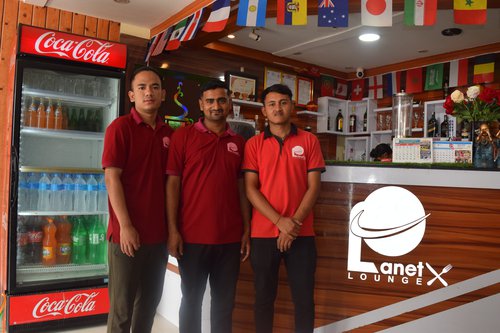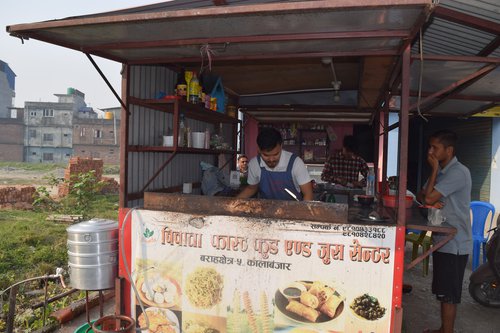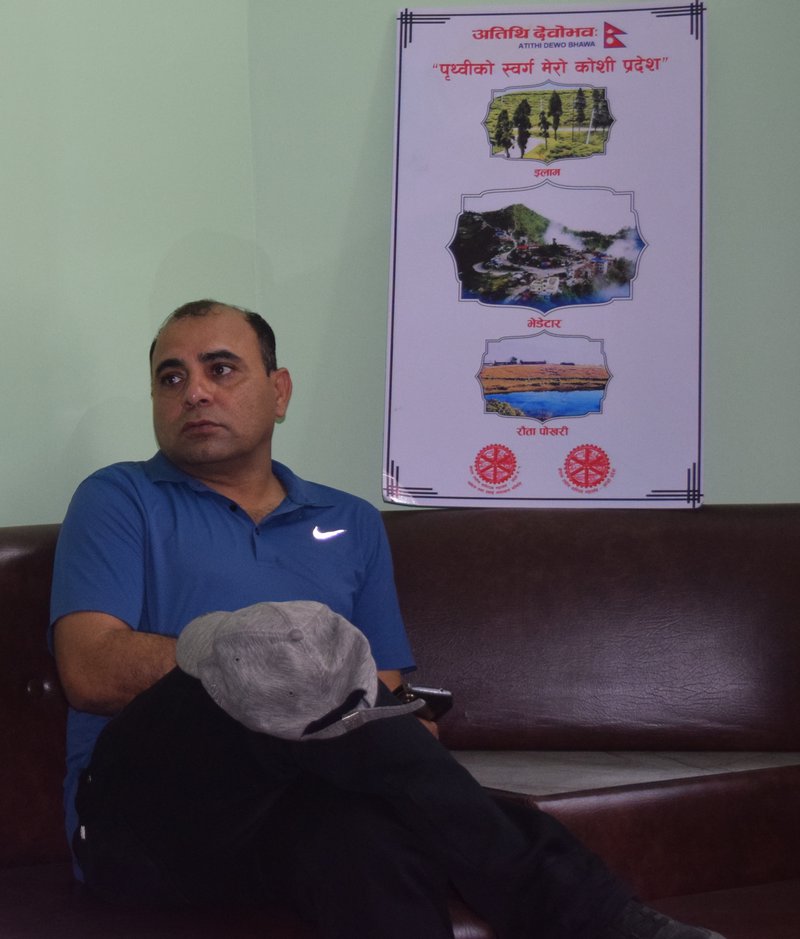
After completing his higher secondary school education, Sudarshan Adhikari, a 27-year-old resident of Mrigauliya Tole in Sundarharaicha Municipality ward 2 of Morang District, made the decision to seek employment in Oman in 2022. However, his plans took a different turn when he came across a public notice from the municipality regarding job skill training in Indian cooking. Intrigued by the opportunity, Adhikari applied for the training and was selected as an apprentice at Planet Lounge, a restaurant and party palace located in Sundarharaicha Municipality ward 10 in Biratchowk.

This notice turned out to be a stroke of luck for Adhikari, as it saved him from the scorching heat of a Gulf country. The Indian cook training, which is a part of the Leading-to-Apprenticeship Model -1 (LAM-1) under the Samriddhi Project, has brought about a significant change in the lives of many young individuals. This project is technically supported by Helvetas Nepal and implemented through a private training and employment service provider company.
Adhikari, who successfully completed the Indian cook training, is one of the beneficiaries of this program. Starting from an apprenticeship, he has now become the manager of the hotel and party palace. With a monthly salary of Rs.30,000.00, Adhikari has decided to abandon his plans of seeking employment abroad. He believes that having a good job close to home, surrounded by loved ones and in a familiar environment, would be foolish to give up for the sake of going abroad. The primary objective of the project is to alleviate poverty and establish sustainable peace by focusing on employment, promoting fairness and inclusivity in economic development. The Samriddi project has successfully expanded the range of economic opportunities available to impoverished rural households and unemployed young individuals. One such success story is that of Adhikari, who through his skills and dedication, earned the trust of his employer and was promoted twice within the past year and a half, ultimately becoming the manager of a restaurant.
In an industry where skilled individuals are scarce, the training provided by the Samriddhi Project is also benefiting hotel owners. Planet Lounge, for instance, has employed four apprentices, including Adhikary, in various roles such as waiters and front desk staff.
All four individuals are now gainfully employed at the restaurant. Purna Bahadur Dahal, a 22-year-old resident of Chitrapur, ward 1 of Sundarharaicha Municipality, has even decided against seeking employment abroad due to his current job, which provides a moderate monthly salary of Rs.20,000.00. However, he remains uncertain about the future. Dahal completed his training as a waiter and is grateful for the opportunities provided by the project.

Despite having a secured job as Indian cook in the Restaurant, Sudip Rai, 20, said that his priority is foreign employment. “If I got job in foreign country, I will go for it. I am earning Rs.20, 000.00 a month but it is not enough to fulfill the needs of the family,” said Rai. He believes that his training can help him to find a good job in Gulf countries.
The journey of Ajit Raj Dhami, 27, a resident of Kalabanjar of Barahachhetra Municipality Ward no 5, is unique. Completed VST Indian cooking Vocational Skill Training (VST) as a part of Leading-to-Apprenticeship Model -1 (LAM-1), Dhami worked for couple of months in local restaurant.
Although Dhami used to receive Rs.25,000.00 ($170) monthly fixed salary at local restaurant in Itahari following the completion of training, he quit the job and decided to start small enterprise on his own.
With a modest investment of around Rs.50, 000.00, Dhami has started a make-shift fast food in rickshaw two years ago. Paying a small rent for a landadjoin the Barahachhetra road, Dhami’s enterprise has thrived in just a matter of year.
With the business grow; Dhami registered his makeshift restaurant in Barahachhetra Municipality as Bibata Fast Food and Juice Center Pvt. Limited.
Backed by his spouse Sunita Dhami, the foods supplied by his makeshift tea stall get popularity for test and quality. With a daily transition of around Rs. 10,000 to 15,000.00, Dhami is able to make net monthly income of around Rs.50, 000.00.
As the demands of tea and other food from his restaurant increased in local areas, currently he hired a local boy as helper proving Rs.10, 00.00 a month.
With the skills and test of foods, he began to receive more order for different food items and eventually started employing others. With two of them regularly engaged in work while on other employed on a need basis
“I don’t need to go anywhere. I am satisfied with what I have been doing here,” said Dhami. “With business doing so well, I don’t think to go aboard for work,” said Dhami, whose elder brother in Kuwait. “We have opportunities back home what we don’t have is skill and idea about doing business. Samriddhi project gave me both.”

An aspirant for foreign job, Yam Bahadur Thapa, 24, a resident of Ling Danda of Myanglung Municipality ward 8 of Terhathum district, has changed his mind after taking Indian Cook training and getting employment Hotel Bagle as a cook.
After learning about the training program provided by the Samriddhi Project in Koshi Province through the partnership of Myanglung Municipality Thapa decided to take training in Indian cooking to learn new skills and increase his income. The training program provided Thapa with knowledge on how to cook various meals and utensils, different ingredients used in the food.
This knowledge proved to be helpful and Thapa was called immediately after completing the training as a full time cook. With a monthly salary of Rs. 17000.00 ($150), Thapa is taking all order in the kitchen. “I have to spare more time on Friday and Saturday and there was normal business in other days. I have to cook many different foods as per the demand of customers,” said Thapa, who was roaming as an unemployed in the village.
All five stories are an example of how skill, knowledge with determination can make everything possible and bring positive changes in people's lives and avert Nepalese to go outside country as unskilled labor.
The training they received not only enhanced their skills and knowledge but also provided them with the opportunity to search for alternative opportunities for sustainability.
These are just a few instances of successful cases that have been supported by the Samriddhi Project. Since its inception, the project has made significant contributions to improving the lives of tens of thousands of individuals residing in 12 districts of Koshi, Bagmati, and Madhesh Provinces.

With the aim of reducing poverty and attaining sustainable peace through employment-focused, fair, and inclusive economic development, the Samriddhi project has expanded the range of economic opportunities available to impoverished rural households and unemployed young men and women.
By promoting self-employment, small businesses, and microenterprises that can generate higher incomes and employment opportunities, both in agricultural and non-agricultural sectors, the project has positively impacted numerous youths.
The role of Helvetas Nepal is to provide Technical Assistance (TA) for implementing the subcomponent 1.3 (Decent Jobs) of Rural Enterprises and Remittances Project SAMRIDDHI).
These trainings were given in partnership with private led Training and Employment Service Providers (T&Es). In year 2023 till now, all allotted training eventsare completed.
Sanjeev Kumar Shrestha, an expert in Value Chain & Markets and a National Consultant at the International Fund for Agricultural Development (IFAD), highlighted that more than 80 percent of trainees in the Technical and Vocational Education and Training (TVET) program have either secured employment or started their own businesses. This achievement is considered a significant success within this particular project," stated Shrestha.
The project has implemented strict provisions where the training providers are only paid once they have demonstrated tangible results, including successful training and employment outcomes.
As per the project guidelines, the training and employment service providers will receive the first installment of payment for conducting the training events. The second payment will be released after thorough verification of the reports and data submitted by the providers.

"Our monitoring process is rigorous and robust. The Samriddhi Project follows a result-based financing model, which requires tangible outcomes for each investment," explained Saroj Prasad Guragain, the Joint Secretary of the Ministry of Industry, Commerce, and Supplies (MoICS) and the Project Manager. "Additionally, during the training period, the VST graduates were also provided with Financial Education and Entrepreneurship Knowledge (FEEK) through collaboration with a subcomponent."
He said that based on the updated curricula on 13 occupations, LAM trainingwas conducted. There is also system of skill test by the National Skill Testing Board (NSTB) and SAMRIDDHI, of the skills trainee.
“The project lesion is a bigger as it showed the training and skill should be given to the local people on the basis of local demand. The result based financing modality ensures the employment guarantee to youth paving the way to find job,” said Sanjeev Shrestha, who involved in the project evaluation team from IFAD. “The project is successful to achieve its goal.”
Dr. Prabin Manandhar, country director of Helvetas Nepal said, “generating employment is key to alleviate poverty and there need a quality and appropriate training for this. Having a long experiences in conducting technical training, Helvetas-Nepal has high quality of knowledge.”
“The experiences and knowledge shared by the participants have shown that Vocational Skill Training (VST) and Leading-to-Apprenticeship Model (LAM) has proved itself to bring a drastic change in the life of many youthsimproving the economic conditions and generating employment opportunities.,” said Sandip Poudel, team leader of Helvetas Nepal.

Samriddhi is taking the lead in addressing the obstacles of wage labor and widespread migration from rural to urban regions and overseas as the project approaches the end of its current phase. With operations spanning across 16 districts in Koshi, Madhesh, and Bagmati Province, IFAD and the MICS have effectively influenced more than 200,000 beneficiaries by providing financial education to around 300,000 individuals.

Keshab Poudel
Poudel is the editor of New Spotlight Magazine.
- KUL MAN GHISING: Bowing Down To The People
- Apr 13, 2025
- POLITICAL VIOLENCE: Culture of Impunity
- Apr 11, 2025
- PM OLI MEETS PM MODI: No Progress
- Apr 09, 2025
- PM OLI’S THAILAND VISIT: Flip Flop
- Apr 08, 2025
- FM Dr. Deuba’s India Visit: Mission Aborted
- Mar 26, 2025














